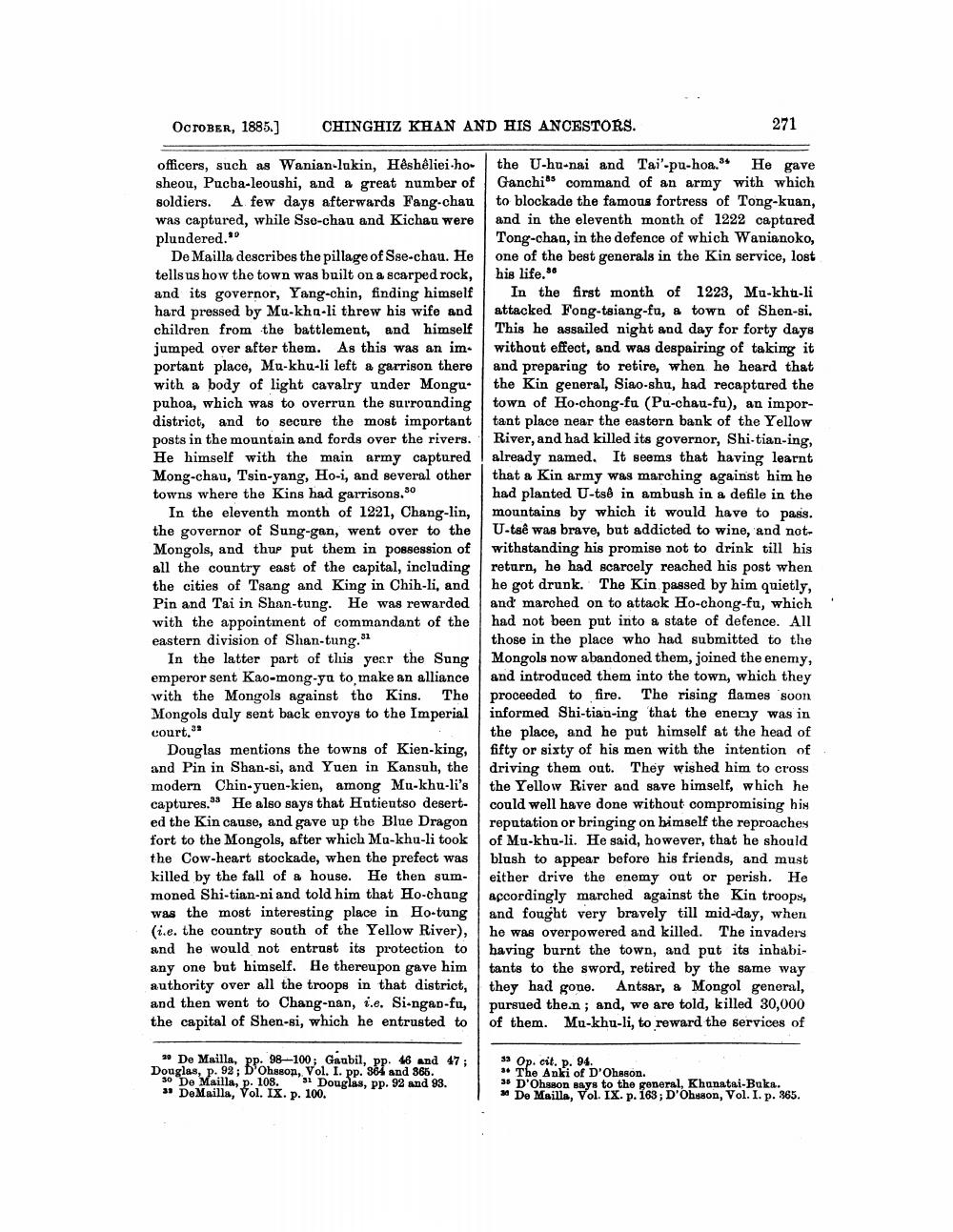________________
OCTOBER, 1885.)
CHINGHIZ KHAN AND HIS ANCESTORS.
271
officers, such as Wanian-lokin, Heshêliei.hosheou, Pucba-leoushi, and a great number of soldiers. A few days afterwards Fang-chan was captured, while Sse-chau and Kichau were plundered."
De Mailla describes the pillage of Sse-chau. He tells us how the town was built on a scarped rock, and its governor, Yang-chin, finding himself hard pressed by Mu-kha-li threw his wife and children from the battlement, and himself jumped over after them. As this was an im. portant place, Mu-khu-li left a garrison there with a body of light cavalry under Mongu- puhoa, which was to overrun the surrounding district, and to secure the most important posts in the mountain and fords over the rivers. He himself with the main army captured Mong-chau, Tsin-yang, Ho-i, and several other towns where the Kins had garrisons,
In the eleventh month of 1221, Chang-lin, the governor of Sung-gan, went over to the Mongols, and thup put them in possession of all the country east of the capital, including the cities of Tsang and King in Chih-li, and Pin and Tai in Shan-tung. He was rewarded with the appointment of commandant of the eastern division of Shan-tung. 32
In the latter part of this year the Sung emperor sent Kao-mong-ya to make an alliance with the Mongols against the King. The Mongols duly sent back envoys to the Imperial court."
Douglas mentions the towns of Kien-king, and Pin in Shan-si, and Yuen in Kansuh, the modern Chin-yuen-kien, among Mu-khu-li's captures. He also says that Hutieutso deserted the Kin cause, and gave up the Blue Dragon fort to the Mongols, after which Mu-khu-li took the Cow-heart stockade, when the prefect was killed by the fall of a house. He then sum- moned Shi-tian-ni and told him that Ho-chung was the most interesting place in Ho-tung (i.e. the country south of the Yellow River), and he would not entrast its protection to any one but himself. He thereupon gave him authority over all the troops in that district, and then went to Chang-nan, i.e. Si.ngap-fu, the capital of Shen-si, which he entrusted to
the U-hu-nai and Tai'-pu-hoa. He gave Ganchios command of an army with which to blockade the famous fortress of Tong-kuan, and in the eleventh month of 1222 captured Tong-chan, in the defence of which Wanianoko, one of the best generals in the Kin service, lost his life.
In the first month of 1223, Mu-kht-li attacked Fong-tsiang-fu, a town of Shen-si. This he assailed night and day for forty days without effect, and was despairing of taking it and preparing to retire, when he heard that the Kin general, Siao-shu, had recaptured the town of Ho-chong-fu (Pu-chau-fu), an important place near the eastern bank of the Yellow River, and had killed its governor, Shi-tian-ing, already named. It seems that having learnt that a Kin army was marching against him he had planted U-tsê in ambush in a defile in the mountains by which it would have to pass. U-tsê was brave, but addicted to wine, and notwithstanding his promise not to drink till his return, he had scarcely reached his post when he got drunk. The Kin passed by him quietly, and marched on to attack Ho-chong-fu, which had not been put into a state of defence. All those in the place who had submitted to the Mongols now abandoned them, joined the enemy, and introduced them into the town, which they proceeded to fire. The rising flames soon informed Shi-tian-ing that the enemy was in the place, and he put himself at the head of fifty or sixty of his men with the intention of driving them out. They wished him to cross the Yellow River and save himself, which he could well have done without compromising his reputation or bringing on bimself the reproaches of Mu-khu-li. He said, however, that he should blush to appear before his friends, and must either drive the enemy out or perish. 1 Accordingly marched against the Kin troops, and fought very bravely till mid-day, when he was overpowered and killed. The invaders having burnt the town, and put its inhabitants to the sword, retired by the same way they had gone. Antsar, a Mongol general, pursued the.n; and, we are told, killed 30,000 of them. Mu-khu-li, to reward the services of
* De Mailla, pp. 98-100, Gaubil, pp. 46 and 47; Douglas, p. 92; D'Ohsson, Vol. I. pp. 864 and 865.
50 De Mailla, p. 108. Douglas, pp. 92 and 93. - DeMailla, Vol. IX. p. 100.
33 Op. cit. p. 94. ** The Anki of D'Ohason. 36 D'Ohsson says to the general, Khanatai-Buka. * De Mailla, Vol. IX. p. 163; D'Ohsson, Vol. I. p. 365.




